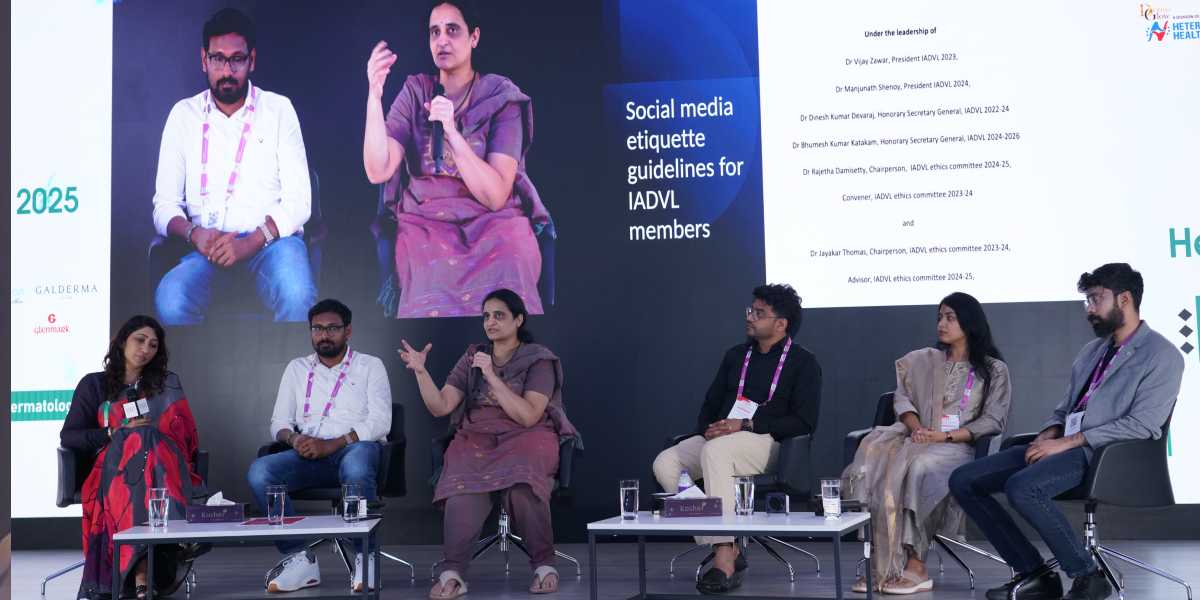Published Nov 13, 2025 | 4:18 PM ⚊ Updated Nov 13, 2025 | 4:18 PM

The session on 'Social Media and Skin & Hair Health' shed light on ups and downs of speaking up.
Synopsis: Dr Sivaranjani’s battle was like watching an Olympic athlete finish a race in two minutes—you only see the victory, not the years of struggle behind it. What people don’t realise is that her fight spanned eight years, and for most of it, she stood alone.
Eight years is not a short period, especially when it is a lonely struggle against corporate giants.
During her eight-year war on misleading ORS companies, Dr Sivaranjani Santosh saw many ups and downs, even a misinformation campaign, some even targeting her personally. Undeterred, she soldiered on.
Her battle was a reality that highlighted both social media’s power to amplify important medical battles and its darker role in disproportionately targeting women doctors who dared to speak up.
At the second edition of South First’s Dakshin Health Summit, Dr Santosh and Dr Rajetha Damisetty shared their experiences fighting misinformation and quackery—and the personal cost of those battles.
Moderating a panel discussion on during a panel discussion on ‘Social Media and Skin & Hair Health’ at the Asian Institute of Gastroenterology (AIG), Gachibowli, on Sunday, 9 November, Dr K Sai Sandeepthi, Dermatologist at Eudermiz Skin, Hair and Laser Clinic, Hyderabad, asked Dr Santosh about social media’s role in her fight against misleading ORS companies: “How much of a role did social media play in amplifying your fight—both in raising awareness during the process and in the aftermath of your win?”
Dr Santosh, Senior Paediatrician, First Aid Trainer, and Social Activist from Hyderabad, revisited her battle: “I was initially writing letters to the authorities, filing the PIL, and following up on the case. But when it comes to amplification, that was almost entirely because of social media, I’d say 90 to 95 percent. It came like a wave. I think that day it just had to happen — and it did.”
Dr Santosh described what had catalysed the social media wave: “When I went online and saw that a doctor had been arrested in Madhya Pradesh over the contaminated cough syrup deaths, I was furious. I said to myself, ‘What nonsense is this? How would I know if a paracetamol tablet has a contaminant in it? You were sleeping until 20 children died, and now you’re waking up! When will you wake up about the ORS issue?’ I just blasted them—and after that, there was no stopping the social-media wave. It took off on its own.”

The second edition of the Dakshin Health Summit 2025 was held at the Asian Institute of Gastroenterology in Hyderabad on Sunday, 9 November.
Dr Rajetha Damisetty, Senior Dermatologist, Founder–Director of Mohana Skin, Hair & Aesthetic Clinic, and Organising Chairperson of Dakshin Health Summit, contextualised what the public didn’t see: “Dr Sivaranjani’s battle was like watching an Olympic athlete finish a race in two minutes—you only see the victory, not the years of struggle behind it. What people don’t realise is that her fight spanned eight years, and for most of it, she stood alone. That’s one of the reasons I’ve started saying we need to look beyond just dermatologists—we need to stand with all doctors. Because when someone like her takes that stand, we have to be there for them, not just when they win.”
Dr Sandeepthi then turned to Dr Damisetty’s experience: “Dr Rajetha, you’ve been one of the boldest voices against quackery in our field. Many of us have seen how you’ve faced trolling—sometimes even personal attacks—for standing up for what’s right. What gave you the courage to keep speaking out so fearlessly, and how did you stay strong through that kind of online negativity?”
Dr Damisetty revealed both her resilience and vulnerability: “I think some of us are made differently. Most trolling didn’t affect me. A few comments did—one in particular about menstruation was a major trigger.”
She described the fabricated attacks: “But I still remember reading another one that said I studied in Manipal for seven years and had multiple boyfriends. In reality, I studied at JIPMER, completed my MBBS in five-and-a-half years, and had only one boyfriend—whom I later married! That’s a different story,” she laughed.
Dr Damisetty’s ability to find humour didn’t mask the seriousness of the issue: “My son was laughing about it too. We were fine because I’ve learned not to let such things get to me. But what I realised is—when they do this to people like me or Sivaranjani, we can handle it. Yet there are so many women out there who get scarred.”
She spoke about the broader impact of such attacks: “The message this kind of trolling sends is: if you speak up, you’ll be humiliated. That’s frightening for many young women. And that’s exactly why I filed a cyberbullying complaint. I eventually lost interest in following it up, but maybe I will take it forward again—just for that reason.”
Dr Santosh added another layer to the challenge: “The thing is, it’s the family that feels it the most—especially if they’re on social media and read these comments. It becomes unpleasant. So I think we have to educate our families too, not just our immediate ones.”
Dr Damisetty shared her family’s experience: “There were my cousins in the US—they’re not doctors—who saw those posts and wondered what was going on. I never discuss these things with family; we hardly get time to talk anyway.”
Yet Dr Damisetty also highlighted moments of professional solidarity: “But during that time, something beautiful happened. So many dermatologists—people I’d never met or even heard of—reached out. They texted, called, and even offered to contribute to legal support.”
Dr Damisetty exposed the gendered nature of online attacks: “The bottom line is that women are targeted more harshly. There’s body-shaming, character assassination. If it were a man, would anyone say he had multiple girlfriends? Nobody would.”
Dr Karishni Chittarvu, Dermatologist and General Secretary of RDA Telangana, Hyderabad, shared her painful experience: “I was a student leader during my postgraduation—the president of the Junior Doctors’ Association at Gandhi Medical College. Once, we were handling a situation where a postgraduate student wanted to end her life. I approached the Head of the Department for help, but turned on me. She questioned why I was speaking up, almost as if it was wrong for a woman to take a stand. That kind of attitude—even from other women—is disheartening. It was one of the most bitter experiences I’ve had.”
Dr Santosh offered encouragement: “Ignore it if it’s harmless, but always make sure your protest is heard. And women—please don’t worry. Don’t let these comments silence you. Don’t let them stop you from speaking up.”
Dr Damisetty emphasised structural solutions: “We need a collective forum. As individuals, we can be targeted easily. But when you have a platform, you’re stronger together. There are so many people who want to speak up and act—but they don’t want to deal with being called the B-word or worse. A united front helps protect those voices.”
Dr Santosh offered tactical advice: “Sometimes the best thing to do is turn off the comments. If the algorithm won’t allow that, then just don’t read them. Or better yet, have someone neutral to handle that space—let them respond or monitor it. You post what you have to, and move on. That’s it.”
Dr Jalagam Vijay, Dermatologist and Co-opted member of Legal and Anti-Quackery Committee at Telangana Medical Council, Hyderabad, advocated perseverance: “No one should feel discouraged. You, ma’am, are the perfect example of that. If you had lost confidence and given up during those eight long years, we wouldn’t be sitting here today talking about your victory. So persistence matters—it may take time, but the results will come.”
Dr Damisetty concluded with hope tempered by realism: “I also hope we’ll see stronger cyberbullying laws and better enforcement soon. Of course, it’s not yet a top priority—there are so many battles ahead of us—but we’ll get there eventually. Maybe that’s how it has to be: each of us taking up different fights, tackling different issues, but moving forward together.”
(Edited by Majnu Babu).

